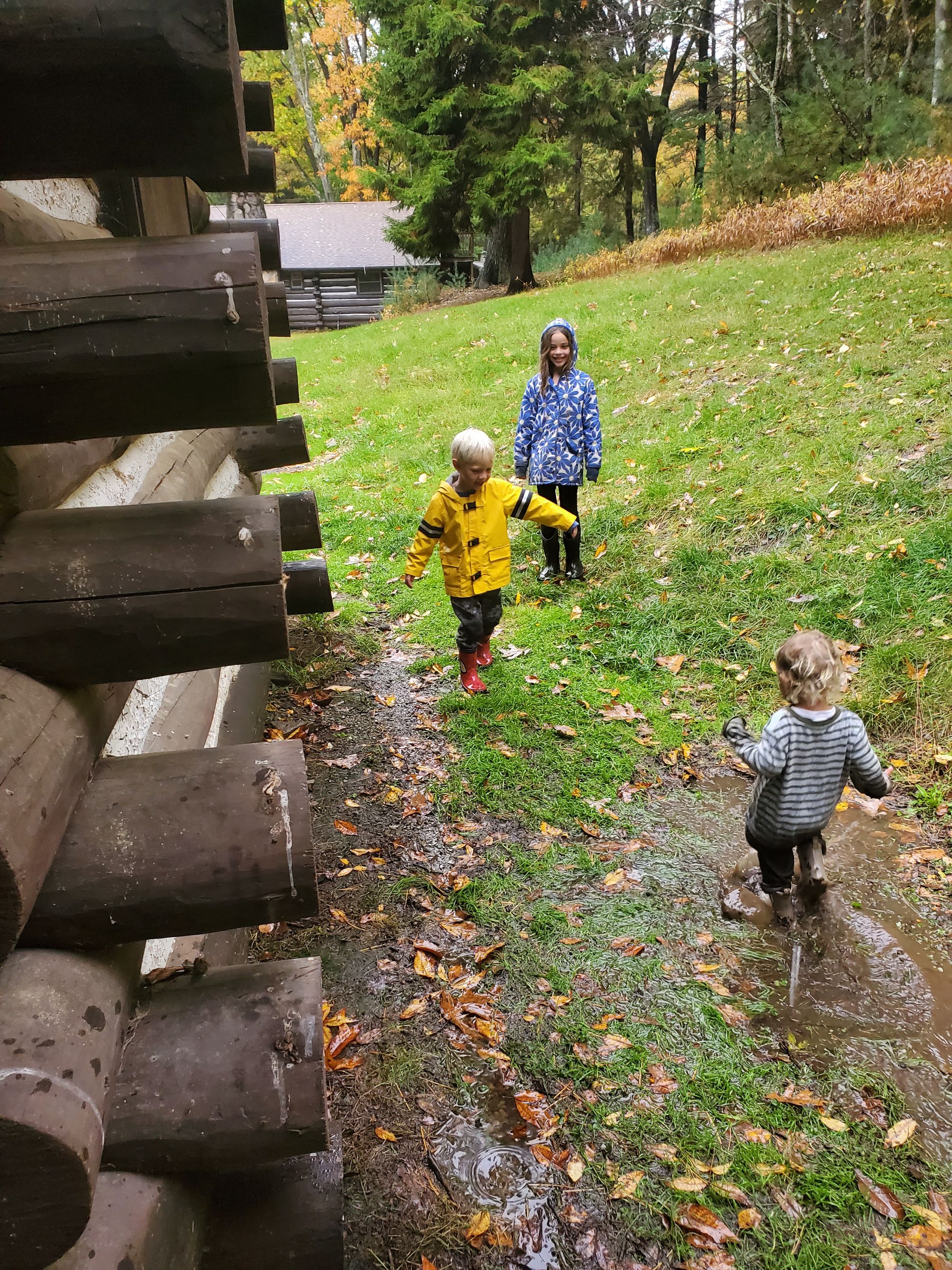Robbing Our Kids Blind

Today we made time to review a concept called "The 8 Forms of Capital".
This is a concept that comes up regularly within the permaculture and holistic management communities, but I haven't seen it much outside of these contexts.
I learned about it through a course on developing a holistic context that I took through Richard Perkins. Richard Perkins gives credit to Ethan Roland and Gregory Landua.
Some people say the ideas have been around even longer, but Roland says that he came up with the idea while developing a course for "financial permaculture". He noted that focusing just on the flows and pools of money within a local economy did not fully capture all the value that was contained within the system.
The 8 Forms of Capital that Roland identified are:
- Financial
- Material
- Living
- Social
- Intellectual
- Experiential
- Spiritual
- Cultural
Your financial capital is your actual money.
Your material capital is the physical, non-living things that you own and control.
Your living capital are the living things that you own, control, or have access to. This includes soil, trees, other plants, animals, etc...
Your social capital is your network and your influence.
Your intellectual capital is the knowledge you have gained throughout life. You can gain this through books, school, courses, lectures, and conversations. Opportunities for learning are everywhere.
Experiential capital is gained through doing things. Reading about something is one thing, actually doing it is something else entirely. We have had gone through many crash courses in the difference between intellectual capital and experiential capital.
Your spiritual capital is the result of strengthening your connection with your self, the Universe, God, or whatever it is you believe in. I like to think of spiritual capital as the good energy that naturally flows from a commitment to what is true and good.
Cultural capital emerges from community. You can't have cultural capital as an individual, but you can benefit from it as a member of a greater whole. These are the rituals and customs of our communities.
Talking about all this makes me ponder what exactly we mean by capital. Two words that jump to my mind are wealth and value.
We're basically trying to get a more complete overview of the different way value flows through a system and the wealth you may have at your disposal.
"Net worth" is something people spend a lot of time trying to increase. That would be a great exercise if you kept all these forms of wealth in mind.
In the context of many projects, people tend to only think of their financial and material capital. Banks certainly only look at these two metrics.
But if you pursue the local optimum of financial wealth, your life will suffer overall as you neglect the other forms of capital you could be accumulating.
If you pursue the local optimum of material wealth, your life and finances will suffer overall.
A business generally is designed to optimize for net worth as measured by financial and material capital. I think this is why many of the most "successful" businesses are a detriment to society as a whole.
They drain capital from other parts of the community.
Earlier I mentioned that we have experienced many crash courses in the difference between intellectual capital and experiential capital.
The two biggest of these crash courses were renovating the house and launching this farm.
Before taking on either of these projects, I spent a huge amount of time increasing my knowledge. I read book after book, took course after course, and watched video after video.
At the onset of each, I was confident that we would be able to achieve good results on a much faster time frame than most people suggested was possible. Sure we were beginners, but we were well-read beginners.
As any old-time farmer is quick to point out, there is no replacement for getting out in the field and actually farming.
Before taking over this farm, I read everything there was to know about rotating animals in a pasture. I could tell you all about why it was beneficial, what tools were available, what schedule you ought to do it on, and what the right plan for winter was.
Wow was actually moving animals a totally different experience than reading about it. None of the books mentioned the part where the cow might be stubborn and take off in the wrong direction. I missed the part where the animals won't understand how cool your new-fangled contraptions are and barge right through them.
If you took two people and had one farm for 4 years while the other studied for 4 years, the guy who was farming would be light years ahead for at least years 1 through 6.
I think intellectual capital is good, but I also think we may be getting things backwards.
We've developed a culture of "study first, do later" when I think a better approach may be "get started, then study to get better".
This is akin to the "ready, fire, aim" philosophy.
This brings me to the whole point of sharing all this tonight.
If you don't already know, we are homeschooling our children.
One of the big reasons we are doing this is because we want them to be building experiential capital first and foremost, then allowing their pursuit of intellectual capital to naturally follow as they become interested in the world around them.
Our curriculum is essentially "life". We have tried to overlay a variety of more formal curriculums, including the most robust and complete one we could find.
Each time we began applying the more formal structure, we found that contrary to speeding up development, it seemed to bring things to a grinding halt in places.
When experience led, the pursuit of intellectual capital was fun and effortless. Kaia willingly and eagerly dove into deep, complicated books.
When we tried to lead with intellectual capital, there was tremendous resistance. We constantly fought over when the work would be done, how much work needed done, and other things like this.
Many people at this stage object and say "but there are things you have to make sure they learn".
To that I say, all the important stuff will be learned. It is impossible not to learn the important stuff. There is no better curriculum than life.
Along these lines, we are finding that if you are patient, children eventually want to learn all the "core competencies" that people fear would be lost if they didn't follow a clear cut schedule.
If you are facilitating a genuine engagement with their world, they will find reasons they want to know numbers and math and science and history. In fact, they will often come eagerly to the very lessons you fought so hard to make them do.
With just a little bit of forethought, you can nudge their individual journey in the direction of particular lessons.
Before you read the science book, take the kid on a walk in the woods. Let them discover weird and crazy things growing on logs. Let them pick stuff up and think about what it might be.
When you get back home, they will devour the books you have. They will demand a microscope to look at their collections with. They will look forward to their education.
Do you realize how different this is from how most children are being educated and experiencing the world right now?
The average child spends their attention in two places: classrooms and screens. These often overlap.
Good teachers bring experiential learning into the classroom. There are good teachers out there. I am blessed to know some.
But I've been through the school system. Most classes have zero experiential learning component. There are some that have a lab, but even they pale in comparison to being out in the world.
When was the last time you asked a kid what their screen time is? I ask this question a lot. Children, unlike adults, are usually happy to check.
The last kid I asked spent 6 hours a day just on TikTok on the weekdays. On the weekends, their total screen time shot up to over 16 hours on one Sunday.
I've asked this question many times. I wish this were an extreme outlier, but it isn't. This is normal.
We have made it normal to send our kids to spend their whole day inside with a narrow age group, then head home and spend the rest of their waking hours looking at a phone screen.
As parents, it is our job to make sure we are setting our kids up for success. I feel like in many ways we are robbing the next generation blind by raising them seriously lacking in experiencial capital.
The fix is simple.
The fix is a process.
Pay attention to your kid and make sure they are engaged with the world around them. Take them to the park. Rent a cabin, and go on a walk in the woods. Go fishing. Go to a farm.
Go out in the real world.
Have fun.
Come up with new ideas to explore.
Repeat.
Moving forward, the development of experiential capital will be a major focus of the community we are building surrounding the Farm.
We've already started building FarmSchool for kids.
And FarmSchool for dogs.
We've started scheduling group adventures.
We're going to host workshops at the farm this summer.
Basically, we want to explore any way we can make more time and space available for people to come and learn and grow by doing.
This may even mean making space available for other aspiring farmers to run their own enterprises if they stack well with what we're doing.
Don't wait for me though. Are you putting anything off until you learn more but never get around to it? Go do the very first thing that comes to mind. Learning will be more fun on the other side.
Anyway, those are some thoughts that came to mind as I reviewed the 8 Forms of Capital this afternoon. There are many other takeaways as well, but those will have to wait for a different day.
As far as FarmSchool goes, I have been getting an increasing amount of people asking questions about this since we got started in the fall.
It's really a simple concept. Parents and kids gathering to have fun and explore the world around them. Age doesn't matter. Bring your babies, send your high schoolers, bring yourself.
If you are interested in this, reach out.
If any useful insights strike you about the 8 forms of capital that we didn't cover today, let me know about them.
Thanks for reading.
Life is good!
